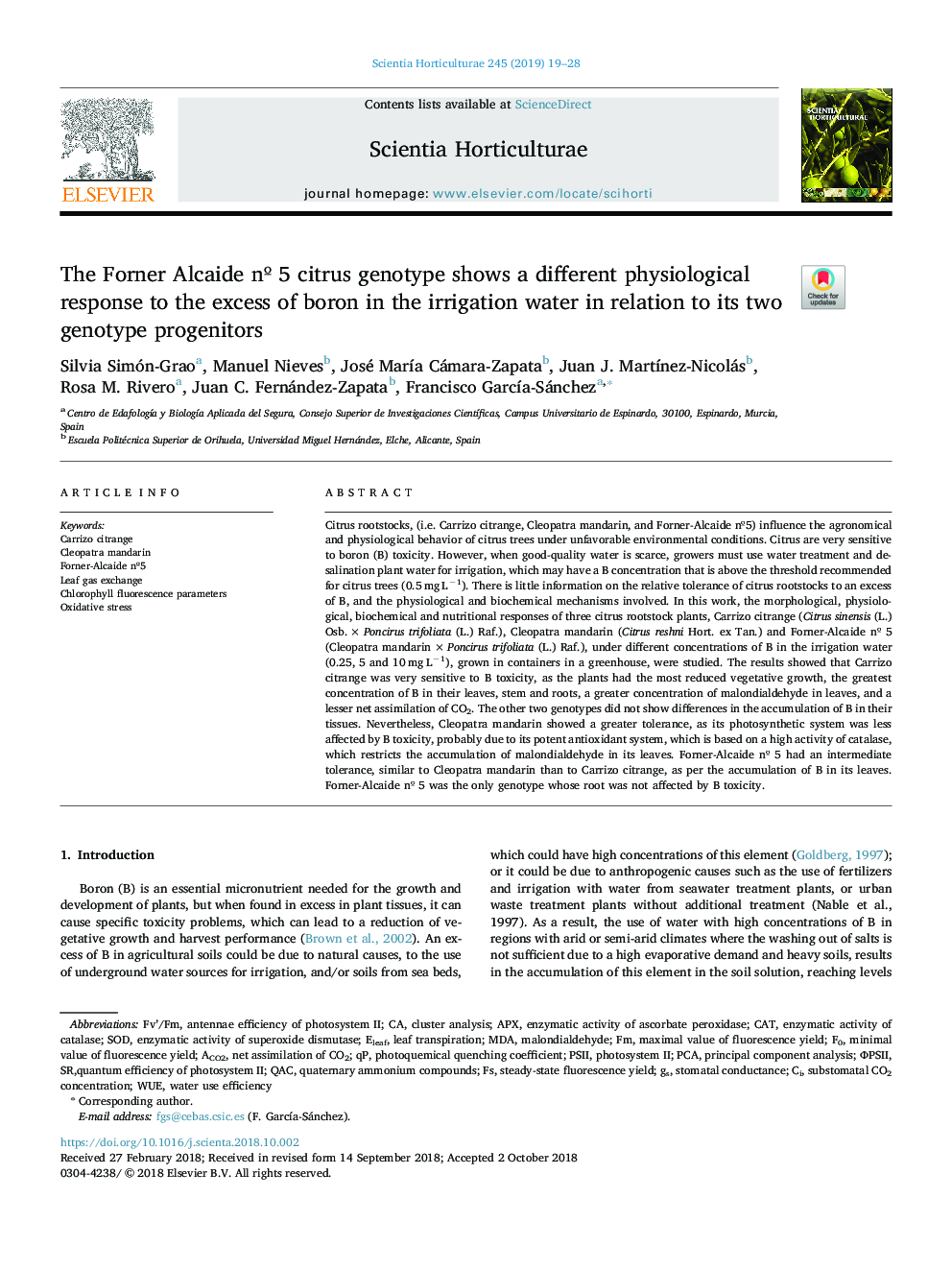| کد مقاله | کد نشریه | سال انتشار | مقاله انگلیسی | نسخه تمام متن |
|---|---|---|---|---|
| 11001870 | 1331597 | 2019 | 10 صفحه PDF | دانلود رایگان |
عنوان انگلیسی مقاله ISI
The Forner Alcaide nº 5 citrus genotype shows a different physiological response to the excess of boron in the irrigation water in relation to its two genotype progenitors
دانلود مقاله + سفارش ترجمه
دانلود مقاله ISI انگلیسی
رایگان برای ایرانیان
کلمات کلیدی
ACO2QACMDAΦPSIICATWUECarrizo citrangeAPXPSIIPCA - PCACluster analysis - آنالیز خوشه ایWater use efficiency - بهره وری استفاده از آبLeaf gas exchange - تبادل گاز برگPrincipal component analysis - تحلیل مولفههای اصلی یا PCAQuaternary ammonium compounds - ترکیبات آمونیوم کواترنریLeaf transpiration - تعرق برگOxidative stress - تنش اکسیداتیوSOD - سدPhotosystem II - فتوسیستم 2malondialdehyde - مالون دی آلدهیدStomatal conductance - هدایت گرمایشیChlorophyll fluorescence parameters - پارامترهای فلورسانس کلروفیلCleopatra mandarin - کلوپاترا ماندارین
موضوعات مرتبط
علوم زیستی و بیوفناوری
علوم کشاورزی و بیولوژیک
دانش باغداری
پیش نمایش صفحه اول مقاله

چکیده انگلیسی
Citrus rootstocks, (i.e. Carrizo citrange, Cleopatra mandarin, and Forner-Alcaide nº5) influence the agronomical and physiological behavior of citrus trees under unfavorable environmental conditions. Citrus are very sensitive to boron (B) toxicity. However, when good-quality water is scarce, growers must use water treatment and desalination plant water for irrigation, which may have a B concentration that is above the threshold recommended for citrus trees (0.5âmgâLâ1). There is little information on the relative tolerance of citrus rootstocks to an excess of B, and the physiological and biochemical mechanisms involved. In this work, the morphological, physiological, biochemical and nutritional responses of three citrus rootstock plants, Carrizo citrange (Citrus sinensis (L.) Osb.âÃâPoncirus trifoliata (L.) Raf.), Cleopatra mandarin (Citrus reshni Hort. ex Tan.) and Forner-Alcaide nº 5 (Cleopatra mandarinâÃâPoncirus trifoliata (L.) Raf.), under different concentrations of B in the irrigation water (0.25, 5 and 10âmgâLâ1), grown in containers in a greenhouse, were studied. The results showed that Carrizo citrange was very sensitive to B toxicity, as the plants had the most reduced vegetative growth, the greatest concentration of B in their leaves, stem and roots, a greater concentration of malondialdehyde in leaves, and a lesser net assimilation of CO2. The other two genotypes did not show differences in the accumulation of B in their tissues. Nevertheless, Cleopatra mandarin showed a greater tolerance, as its photosynthetic system was less affected by B toxicity, probably due to its potent antioxidant system, which is based on a high activity of catalase, which restricts the accumulation of malondialdehyde in its leaves. Forner-Alcaide nº 5 had an intermediate tolerance, similar to Cleopatra mandarin than to Carrizo citrange, as per the accumulation of B in its leaves. Forner-Alcaide nº 5 was the only genotype whose root was not affected by B toxicity.
ناشر
Database: Elsevier - ScienceDirect (ساینس دایرکت)
Journal: Scientia Horticulturae - Volume 245, 9 February 2019, Pages 19-28
Journal: Scientia Horticulturae - Volume 245, 9 February 2019, Pages 19-28
نویسندگان
Silvia Simón-Grao, Manuel Nieves, José MarÃa Cámara-Zapata, Juan J. MartÃnez-Nicolás, Rosa M. Rivero, Juan C. Fernández-Zapata, Francisco GarcÃa-Sánchez,